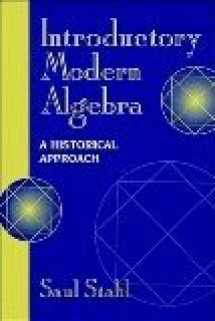
Introductory Modern Algebra: A Historical Approach
Book details
Summary
Description
Presenting a dynamic new historical approach to the study of abstract algebra
Much of modern algebra has its roots in the solvability of equations by radicals. Most introductory modern algebra texts, however, tend to employ an axiomatic strategy, beginning with abstract groups and ending with fields, while ignoring the issue of solvability. This book, by contrast, traces the historical development of modern algebra from the Renaissance solution of the cubic equation to Galois's expositions of his major ideas.
Professor Saul Stahl gives readers a unique opportunity to view the evolution of modern algebra as a consistent movement from concrete problems to abstract principles. By including several pertinent excerpts from the writings of mathematicians whose works kept the movement going, he helps students experience the drama of discovery behind the formulation of pivotal ideas. Students also develop a more immediate and well-grounded understanding of how equations lead to permutation groups and what those groups can tell us about multivariate functions and the 15-puzzle. To further this understanding, Dr. Stahl presents abstract groups as unifying principles rather than collections of "interesting" axioms.
This fascinating, highly effective alternative to traditional survey-style expositions sets a new standard for undergraduate mathematics texts and supplies a firm foundation that will continue to support students' understanding of the subject long after the course work is completed.
An Instructor's Manual presenting detailed solutions to all the problems in the book is available upon request from the Wiley editorial department.


We would LOVE it if you could help us and other readers by reviewing the book
Book review



